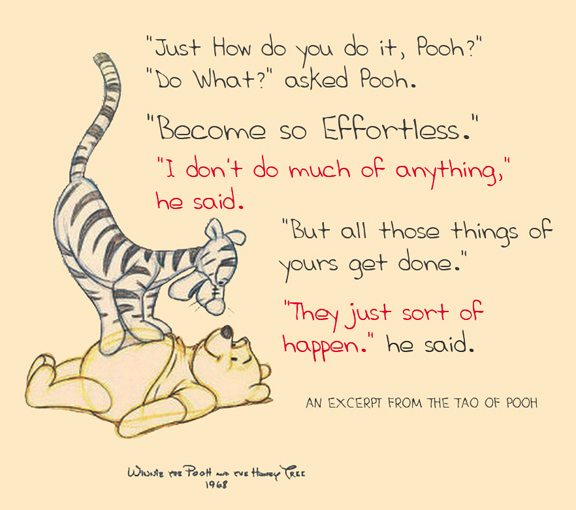

One may say that Winnie the Pooh is the ultimate Taoist – a simple cog in the greater machine of life, following the wind, wherever it may take him. He has no long term goals or dreams – no daunting challenges, no anxiety or pain.

He doesn’t worry, he doesn’t stress in fact, he doesn’t do much at all. He takes things as they come and gets worked up over nothing. Pooh Bear makes his way peacefully through life. A creature of big jumps, but low intelligence.Īnd then there’s our old friend, Winnie the Pooh – a simple bear, easy to please, low maintenance, slow to anger, the epitome of go-with-the-flow.

Does choosing to follow Taoism choosing to simply be stagnant?īut this was the moment I began to realize – it must be more complicated than that. If we don’t push ourselves, how are we to become rich and famous? Our egos will starve and shrivel into little balls of dust. We hunt for positions of power as we dangerously climb the corporate ladder. Who could believe that choosing a life of noninterference is the ultimate way to success? Human beings are power hungry and constantly looking to be better, faster, stronger. Your average Western thought leader will not accept a mantra such as this one. How can anyone journey through their life without running any interference? What does this look like? In fact, a lifestyle like this one seems to go directly against human nature for every reason you may be thinking. Pardon the sarcasm, but you see where I’m going with this.

Maybe if I wander around aimlessly, nature will simply guide me to a successful, bountiful life. Please hold, let me cancel all my plans for the next week, stop applying for jobs, and take a trip to the garden behind my house. We we were meant to go with the flow and accept that whatever’s meant to be will be the end. In other words, this ancient Chinese practice advocates for the notion that everything happens for a reason. “Tao” (pronounced Dao) literally means “the way.” This mantra believes that a happy life can be achieved by following the course of natural events without interfering or overthinking. This is how I feel about Taoism - a Chinese philosophy that advocates for a life of utter simplicity and noninterference. With a selection of lyrical color landscape photographs by the author, this is a unique, and uniquely accessible, presentation of the Tao Te Ching.SeptemNo Comments Intro to Taoism and How it’s Counterintuitive to Human NatureĮvery here and there we find ourselves bumping into foreign concepts that could be either one of two things – extremely simple, or, entirely beyond our realm of understanding. And Hoff’s chapter notes shed new light on the author’s surprisingly modern viewpoint. Hoff also makes the provocative claim-and demonstrates by revealing clues in the text-that the Tao Te Ching’s author was a young nobleman hiding his identity, rather than the long-alleged author, the “Old Master” of legend, Lao-tzu. Hoff points out in his chapter notes the many incidents of meddling and muddling that have been made over the centuries by scholars and copyists, and he corrects the mistakes and removes such tampering from the text. The Eternal Tao Te Ching is the first translation to employ the meanings of the pre-writing brush characters in use 2,400 years ago, when the classic was written, rather than relying on the often-different meanings of the more modern brush characters, as other translations have done. From Benjamin Hoff, author of The Tao of Pooh and The Te of Piglet, which have sold millions of copies worldwide, comes The Eternal Tao Te Ching, a new translation of the Chinese philosophical classic, the Tao Te Ching. The bestselling author of The Tao of Pooh offers a uniquely authentic translation of the enduring Tao Te Ching, based on the meanings of the ancient Chinese characters in use when the Taoist classic was written.


 0 kommentar(er)
0 kommentar(er)
